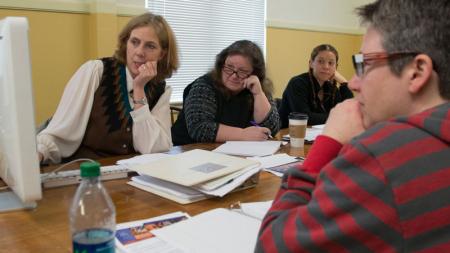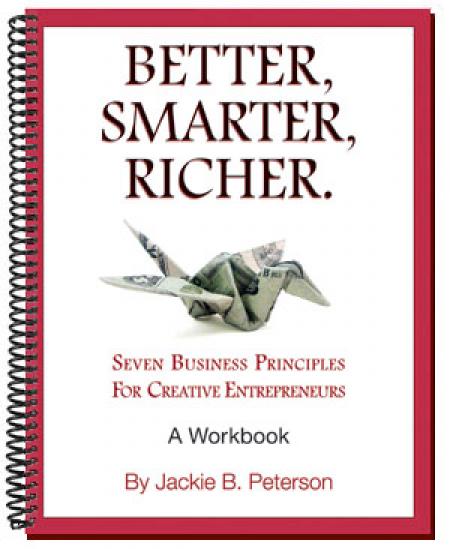Improving Your Art Business
Tips from Business Coach Bonnie Kahn

Improving Your Art Business: Tips from Business Coach Bonnie Kahn
Spend two minutes with Bonnie Kahn and you’ll notice how smart, focused and generous she is. You’ll probably want to hire her as your business coach. And many artists who’ve taken her “Better, Smarter, Richer” class – also known as artists’ boot camp – would encourage you to. Bonnie took the time to share some of her artist success tips with UAN.
Learning from Native Americans
Although Bonnie isn’t Native American, part of her childhood was spent on the Tulalip reservation in Snohomish County, Washington. Her mother worked for the Bureau of Indian Affairs. This early introduction to Native American culture sparked Bonnie’s lifelong passion for Indian art. She worked in many capacities within the art world, specializing in Native American and Western art.
Bonnie also learned about a tribal approach to business. “You have to reach out to the community to build your business,” she said. And you do it through hiring subcontractors. “They in turn want to help you because they want to support your business. You can’t build business with just you. You have to build a tribe.” Your business tribe is also essential for combating the isolation that can plague artists, she says.
Art is serious business
Many artists downplay their work, underpricing it and talking about it dismissively. Time to stop that. “Fifteen billion dollars’ worth of art sold in the world last year,” Bonnie says. “I look at art extremely seriously as a way of making a considerable amount of money.”
Bonnie is working hard to finish writing her newest book, 7 Steps to Become an Art Warrior. The book will help readers devise their battle plans. What makes an artist a warrior? Consciousness and confidence. “They don’t care what critics say, and they don’t care if sales are slow, because they know who they are. That’s the secret to building a successful career.”
Confidence
Bonnie understands that building your successful art career takes time. Initially, you might need an additional, more lucrative career. But the more you focus on your art, the better. “You have to truly have faith in your abilities,” says Bonnie. “You communicate that confidence to others and they want to be aligned with you and your work. We’re animals. We’re still on the savannah. We’re drawn to people who are confident. Because that’s what we need in order to survive. The more confident and powerful you are, the better your career will become.”

Branding
What allows companies to demand high prices? A strong brand. And it’s the same thing for artists. “Your brand is how the world sees you,” says Bonnie. Artists need to be clear about their values, and how those values come across in their work, marketing and self-presentation.
For example, Pacific Northwest Native American artist Lillian Pitt uses the tagline “Giving voice to my ancestors.” Art buyers know that her work will reflect the 10,000 years her people have been in the Columbia River Gorge. This niche helps her develop a loyal following who value the quality of her work, her subject matter and her heritage.
Find your story
Bonnie was only five years old – a self-described bucktoothed little blonde kid -- when she learned how a good story helps business. She told her father she needed money. “He pointed to a bunch of oyster shells and said, ‘Go sell the oyster shells.’” So she dragged them down the street and stood under a totem pole. “People would drive by and ask what I was doing.” She told them oyster shells made good ashtrays. “They took my picture because it was novel.” She sold out.
People want to know your story, whether you’re a bucktoothed kid selling oyster shells, a single mom with a passion for
textile art, or a painter who grew up in three communes on three different continents.
Bonnie impresses the importance of story onto the people she coaches. “Every artist I work with, I say, ‘What is your story?’”
Selling
Too often, Bonnie sees artists discount their prices, even when customers haven’t asked and have no intention of doing so. Instead, Bonnie encourages artists to have confidence that people are wise to invest in what the artist is doing.
She teaches artists the complicated process of closing sales. “They’re not taught that in art school,” she says.
Bonnie emphasizes the power of silence. “When a person goes for the close, the next person that speaks loses.” How does the artist lose? By discounting or justifying the price, which undermines confidence, perceived value and brand strength.
Practice stating your prices confidently, then shutting your mouth. “People don’t say no if you say it with enough bravado.”
Track your sales – and your customers
Once artists sell a piece of work, they need to maintain a connection with the buyer. “It drives me insane how artists don’t keep track of their clients,” Bonnie says. Usually artists say it’s too much work to keep in touch. If artists don’t like maintaining contact through newsletters or social media, Bonnie suggests hiring somebody to do it for them.
Form your business tribe
Many small business owners hate networking. They don’t want to brag about themselves to strangers, and the strangers usually aren’t impressed anyway. So what’s the secret to successful networking? “Going in and not networking for yourself, but others,” Bonnie says. At networking events, she listens to what people need, and then promotes members of her business tribe who have the necessary skills.
Artists need to use their tribe members to maximize their time and profits. The number one thing Bonnie tells artists to outsource is bookkeeping. Number two is their website.
“How many artist say, ‘I need to learn to build a website.’ Why?” She gives an example of an artist who finally handed off his web design to a pro. Now he frequently calls Bonnie with updates about how much art he’s selling from his site.
You can’t be good at everything, and there’s just not enough time. Hire your tribal members to help.

Take Bonnie’s class
Bonnie’s artist boot camp is built around Jackie B. Peterson’s book Better, Smarter, Richer: 7 Business Principles for Encore, Creative and Solo Entrepreneurs. The BSR model helps entrepreneurs identify their niche and develop a business mindset. Bonnie teaches small groups in a roundtable style. “When people don’t take time to understand business, they get taken advantage of,” she says. “I find that really sad.” She also does one-on-one business coaching.
In her classes and coaching sessions, Bonnie works with individuals to build the careers they want. “As a coach, you have to kind of move yourself from their career and have them take the wheel,” she says. “Money is not what it’s all about. It’s time. How they can maximize their time to create the life they want to lead.” Every client she works with ultimately finds the same thing holding them back: themselves. Bonnie dreams of helping them break through these barriers and freeing the artist warrior inside.
“I feel that there are enough baristas in the world,” she says with a laugh.
Visit Bonnie’s website to keep up with her books, classes and coaching opportunities. http://bonniekahn.com/